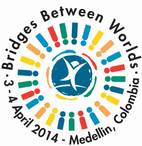03.04.2014

Download the press release | PDF135KB
Medellin and Geneva Over 300 representatives of states and international and non-governmental organizations, along with dozens of landmine survivors from all over the world, have begun two days of in-depth work on how to meet the rights of landmine and other explosive remnants of war victims and survivors in broader domains.
The conference entitled Bridges between Worlds aims to advance the promise made to these victims through the Anti-Personnel Mine Ban Convention, or Ottawa Convention.
“Hosting this historic event in Medellin is not a mere coincidence,” said Colombian Vice-President Angelino Garzon.

“This great city is located in the most mine-affected department in Colombia. Thousands have fallen victim to anti-personnel mines. We must now ensure that their care and rehabilitation, and the guarantee of their rights, is integrated into other government programmes to benefit not only landmine survivors but all other persons with disabilities," said Vice-President Garzon.
"This is true not only for Colombia but for all states responsible for the wellbeing of landmine survivors. We hope that this conference in Colombia is the first of many worldwide where bridges between worlds can be built. Colombia welcomes you,” said Vice-President Garzon to the women and men who arrived in Medellin to participate in the discussions.

Over 35 States registered to participate in Bridges between Worlds, including the following 10 states that are responsible for the well-being of significant numbers of victims of landmines and other explosive remnants of war: Afghanistan, Cambodia, Colombia, El Salvador, Jordan, Lebanon, Peru, Tajikistan, Thailand and Uganda.
In addition, organizations contributing their expertise to the event include the United Nations Office of the High Commissioner for Human Rights, the International Labour Organization, the World Health Organization, UNICEF, the International Campaign to Ban Landmines, the International Disability Alliance, the International Disability and Development Consortium and Handicap International.

“Bridges between Worlds is unlike any other landmine victim assistance conference that has taken place to date,” said Kerry Brinkert, the Director of the Anti-Personnel Mine Ban Convention’s Geneva-based secretariat.
“This is a unique opportunity for those involved in assisting landmine victims to engage a broader world of experts who concern themselves with disability, health, education, employment, gender and development to ensure that the Convention’s promise to landmine victims is fulfilled in these broader domains. It is also a chance for disability, health care and other experts to better appreciate the needs and challenges of landmine victims.”

A Colombian landmine survivor participates in the moderated discussions at Bridges between Worlds in Medellin
Funding for the conference is being provided by Colombia, several international Colombian partners and the European Union.
Through the Council Decision, the EU supports states in overcoming challenges in implementing the Convention, including the integration of landmine victim assistance efforts into broader disability contexts.
The results of Bridges between Worlds will be presented in Geneva by the Colombian delegation attending the Intersessional Meetings on 9/11 April.

With Bridges between Worlds taking place 15 years after the Convention’s entry-into-force and on the eve of its third five-year review in June in Maputo, it is hoped that the outcomes of the conference will significantly contribute to enhanced efforts to assist landmine survivors during the next phase of the Convention’s implementation.